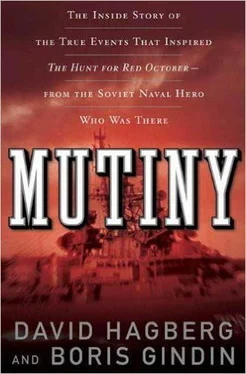“Yes, sir.”
“You will personally see to it that nothing of this incident is broadcast to anyone else for any reason. No matter who that might be. Do you understand that order?”
“Yes, sir,” the duty officer says unhappily. Like a lot of other people this morning, he is caught between a rock and a hard place and he knows it.
“Now, move it, Lieutenant,” Gorshkov says, and he slams down the telephone.
Markin appears at the door. “Will we be dressing in full uniform or civilian attire with medals this morning, sir?”
“A civilian suit. No medals.”
A light northwest wind is blowing from the open gulf as the Storozhevoy passes the last sea buoy marking the river channel. The fog, which had cleared for a little while, thickens again. Stepping out onto the starboard wing, Sablin can look straight up and see stars, but dead ahead the ship’s bows are only avague outline.
Continuing at this speed out into the gulf blind is tantamount to suicide. It’ll be dawn in a few hours, but in the meantime if the Storozhevoy, with his sharply flaring, heavily armored bows, collides with another ship, there will be injuries and deaths. That is a certain fact.
Sablin’s original plan was to sail out almost due west until they cleared Saaremaa and Hiiumaa islands before shaping a course north and than back east to the narrow opening into the Gulf of Finland and from there continuing the four hundred kilometers to Leningrad, where he would broadcast his tape-recorded speech directly to the Soviet people.
But Firsov has jumped ship and has undoubtedly told the Riga harbormaster about the mutiny. The word will have reached Moscow by now and it will not be long until someone comes after them.
Sablin takes another look up at the stars, then steps back into the enclosed bridge. The two men look up, trying to gauge from the expression on his face how things are going. But he’s holding himself in check, making sure he does not show his uncertainity to his men.
“Has anyone tried to contact us by radio?”
Their navigation radar is still off, so Seaman Maksimenko has nothing to do except study the paper charts and listen for radio messages. He shakes his head. “Nothing, sir.”
“If they try to contact us, don’t answer. No matter what is said, don’t answer.”
Maksimenko and Petty Officer Soloviev are alarmed.
“Are you leaving us?” Maksimenko asks.
“Just for a minute or two,” Sablin says. “I need to get something from my cabin. If anything comes up, page me on the 1MC.”
“But, Captain, we are sailing blind,” Soloviev says from the helm. “We passed the last sea buoy, and now I am running only on the compass and the fathometer.”
The only two pieces of information that the helmsman can rely on at this point are the compass, which shows him that they are heading just slightly west of north, and the fathometer, which shows the depth of the water and that will warn them if they get too close to land. Before they can make their turn to the west to get past Saaremaa Island they must reach Kolkasrags, which is the Latvian headland at the northwesternmost point of the Gulf of Riga. It’s more than two hundred kilometers away. It will take another six or seven hours before they get there.
Sablin is thinking at the speed of light. They have passed their first two serious hurdles, taking over the ship and making it downriver to the gulf. They can do this if no one loses his head.
“You may turn on the radar set every fifteen minutes, but only long enough to make sure we’re not on a collision course with any other ship.”
Soloviev is relieved. “Thank you, sir.”
If anyone is looking for them, the moment their radar starts emitting, the game will be up. Sablin just needs his luck to hold a little while longer.
“And don’t aswer the radio, no matter who it is,” he warns.
Soloviev and Maksimenko nod their agreement, and Sablin leaves the bridge and hurries down to his cabin.
A potentially very large problem they might encounter is uncertainty about their intentions. In order to clear the islands, so that they can make the turn into the Gulf of Finland toward Leningrad, they have to sail directly toward Sweden. If a recon aircraft is sent up to find them or if they are tracked by their radar emissions, it will appear to Baltic Fleet Command that the Storozhevoy is trying to defect.
Such an act is even worse than mutiny. It is treason.
The only way that Sablin can think to prove that he is not planning on sailing to Sweden is to broadcast his message right now. Because of the damage Firsov has done to Sablin’s plan, he can no longer afford to wait until the Storozhevoy reaches Leningrad.
All of the crew not under arrest are at their posts. Sablin has called boevaya trevoga, battle station. No one wants to be hanging around their quarters this morning. Too much is happening. Everyone is too keyed up even to find Gindin’s stash of spirt.
Sablin reaches his quarters without encountering a single soul, which is spooky. The Storozhevoy is barreling up the coast toward the open Baltic Sea, his engines spooled up to top speed, and yet the corridors and companionways are deserted. No one is hanging around smoking a cigarette; no music plays from the seamen’s mess; no one is making jokes.
Once he has his safe open, he removes the taped message and retraces his steps up to the radio room, where a midshipman and an ordinary sailor are sitting in front of their radio equipment. For the first time Sablin draws a blank on their names. He knows their faces, but he cannot dredge up their names or anything else about them from his memory. And right now he is too excited, too focused, to ask.
Both men look up, alarmed by what they see in Sablin’s expression. “Are we okay?” the young midshipman asks.
“We’re perfectly okay,” Sablin replies. He hands over the tape. “This explains everything.”
“Sir?” The young officer is jumpy.
“It’s a message I taped. I want it sent out immediately on a civilian broadcast channel. The people need to know what we are doing, and why.”
The young officer holds the tape as if it were a wild animal ready to bite him. “When should we send this?”
“Right now!” Sablin fairly shouts. His nerves are finally starting to bounce all over the place. So much is at stake, and he hasn’t gotten any decent sleep or rest in the past week. He’s been too keyed up, knowing what was coming.
If only Firsov had not jumped ship!
The midshipman just sits there, a dumb expression on his face, like a deer caught in headlights.
“Now!” Sablin shouts. “Send it right now!”
“Yes, sir.” The young officer turns, shoots a look at the seaman sitting next to him, mounts the loaded reel on the recorder’s left spindle, and threads the tape through the heads to the empty twenty-five-centimeter reel on the right.
Sablin remains only long enough to see this much before he turns and hurries back up to the bridge. He has to make sure that the radar set does not remain on. Everything is coming together now. Everything is coming to a head, and yet there is so much left to accomplish.
Just a little more luck. It’s all he asks for.
Midshipman Yevgenni Kovalev has loaded the tape correctly on the machine, his hands shaking. Whatever message their zampolit has recorded will certainly be controversial.
The recording is Zampolit Sablin’s business, but a radio message from the Storozhevoy while Kovalev is on duty is his business.
The crew has mutinied; the captain was under arrest; what made you believe that it was your duty to send such a message en clair so that everyone in the Soviet Union could understand your shame?
Читать дальше












